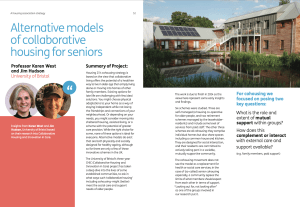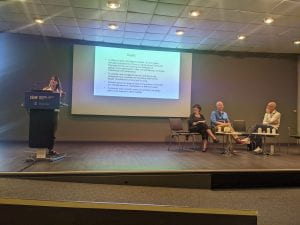Collaborative Housing, Ageing and Social Care – Lessons from Europe
Growing out of our 2023 Barcelona conference, this multi-disciplinary book explores how emerging citizen-led innovations in Collaborative Housing and care are challenging mainstream ways of living and ageing across Europe. Edited by Melissa Fernandez Arrigoitia, Aimee Felstead, Jim Hudson, Misa Izuhara, Kath Scanlon and Karen West, to be published on 9th September 2025 by Policy Press, Bristol.
There’s a 50% discount available untill 31st Dec 2025, available here or by using discount code DSC50.
Combining academic theory with practice, the book demonstrates the far-reaching impacts Collaborative Housing with care can have on independence, agency and wellbeing in later life. With contributions from France, Spain, Sweden, the Netherlands and the UK, it offers insights into the key challenges and opportunities associated with developing and sustaining models of Collaborative Housing with diverse forms of care and support over the life-course.
Essential reading for academics, practitioners and policy makers in housing, planning, social care, design and social gerontology, this book proposes a renewed focus on non-paternalistic forms of social and housing care that speak directly to older people’s needs, and that work against the marketisation of care and towards a community-led and co-managed approach in later life housing for all.
December 2024 – What is community-led housing, how does it work, and is it a useful response to the housing crisis?
Jim Hudson explains all, in a presentation to Bristol Civic Society. Online event (with some 200+ attendees), recording available here.
April 2024 – Sociable living in London for older people: four projects
Jim Hudson and Kath Scanlon visited four schemes which caught our attention as being exceptionally well-designed (one was the winner of last year’s Stirling Prize for the UK’s best new building), or taking an innovative approach to housing provision in some other way. We’ve written a blog post about it here.
March 2024 – HousingLIN summit event: “Innovative mainstream and specialist housing solutions”
Presentation of CHIC findings and recommendations by Jim Hudson and Karen West, plus a discussion session with:
Lynn Lewis, Director of Independent Living at The Guinness Partnership;
Nick Sinclair, Director of the Local Area Coordination Network
Joe Farrington-Douglas, Senior Policy Fellow, The Health Foundation
23 January 2024 – Our report on the CHIC project is now available for viewing or download here. A big thanks to everyone involved in the launch event and panel discussion. You can watch a recording of the event below:
October 2023 – Karen West and Jim Hudson have a short chapter in a new publication from the UK Cohousing Network and housing provider Housing21, called Housing Associations and Cohousing; How to create inclusive, affordable, collaborative neighbourhoods for older people. Available for download here: https://cohousing.org.uk/publications-and-research/ or in our own site here: HA-Co-housing-guide_2

17 October 2023 – Presentation for HousingLIN’s event on Collaborative Housing and Care Solutions
With Dr Jim Hudson: details available at https://www.housinglin.org.uk/Events/HAPPI-Hour-Collaborative-Housing-and-Care-solutions/
13th October 2023 – Presentation at the Radical Housing Conference, Bristol
Jim Hudson spoke as part of the Care & Inclusion segment of the conference: https://agile.property/radical-housing-association-2/
3 July 2023 – CHIC Film
We’re pleased to announce that we’ve recently made a short film about the CHIC project, involving some of those who took part in the research, and which you can access on our site page here.
26 June 2023 – Transforming Care Network, 6th Annual Conference, Sheffield 
Thematic Panel: Exploring innovative collective care practices in housing and communities
Convenors: Misa Izuhara and Karen West
Karen West and Aimee Felstead presented our paper, entitled “Mutual support in collaborative housing: Intermediaries and transitions in later life” (Authors: Karen West, Aimee Felstead, Melissa Fernández Arrigoitia, Misa Izuhara, Jim Hudson, and Kath Scanlon).
6 June 2023 – Collaborative Housing and Innovative Practices in Care: An International Exchange.
In early June we hosted a one-day event in Barcelona, focusing on European research, practice and lived experiences at the intersections of collaborative housing (CH), innovative care practices and ageing. Read about it here.

7-9 June 2023 – International Social Housing Festival, Barcelona
Following straight on from our CHIC event, Melissa Fernández Arrigoitia convened a workshop on “Care in the center: active ageing in community housing” at the International Social Housing Festival. This very successful event included a short presentation and first showing of our CHIC short film. Other panellists were Roser Casanovas from Barcelona’s feminist urban design collective, Col.lectiu Punt 6, representatives from the city of The Hague, the Dutch Housing Association Stadeon and Jim Hudson from our own CHIC team.




25 May 2023
Online presentation by Jim Hudson of our CHIC and wider research, hosted by Bristol Council and attended by policy makers and practitioners from Bristol, South Gloucestershire and North Somerset.
12 April 2023
Online talk for AWoC (Ageing Without Children) given by Jim Hudson. You can watch a video of Jim’s talk here.

18-19 April 2023 – NIHR SSCR conference, LSE, London
Presentation of CHIC project early findings, Jim Hudson and Karen West.
March 2023
A new blog post on our work, written for our funder the NIHR SSCR by team member Jim Hudson, which you can find here.
27 Feb 2023 – “People + Place = Connected Communities”
Presentation of CHIC project early findings, by Jim Hudson. Event hosted by the HousingLIN at their annual summit, including . Link to event details here.
8 Feb 2023 – Making Research Matter in Practice
“Collaborative housing for older people and innovative practice in social care (CHIC study)” presentation by Jim Hudson. Showcasing findings from the latest research projects on adult social care based in the Centre for Research in Health and Social Care, School for Policy Studies, University of Bristol. The projects presented are funded by the NIHR School for Social Care Research.
October 2022 – Cohousing Workshop, Springhill Cohousing, Stroud
Event organised by Housing21, including CHIC presentation from Jim Hudson and Karen West.
6-8 July 2022 – British Society of Gerontology Annual Conference (hosted online by UWE, Bristol)
Presentation of CHIC project early findings, by Karen West and Jim Hudson.
May 2022 – Community-led housing and how it can contribute to tackling loneliness
Presentation by Kath Scanlon and Jim Hudson (including some early thoughts on our CHIC project), with round table discussion and Q&A also with Melissa Fernández Arrigoitia and Karen West. Hosted by the Housing LIN, event link here.
April 2022 – Knowledge exchange day between CHIC and RAPSoDIÂ projects
RAPSoDIÂ is a similar French-based research project seeking some of the same answers as CHIC in the context of social care. http://halage.info/les-echos-de-rapsodia/
12-14 April 2022 – Urban Affairs Association 50th Conference: Shaping the Future of Urban Research
Washington, DC. Melissa Fernández Arrigoitia and Karen West presented on the CHIC project as well as their previous research with the Older Women’s Cohousing (OWCH) scheme in London.
March 2022 – Lecture to Urban Design MSc at the Bartlett School of Planning, London
One of several lectures given by Jim Hudson as part of the MSc module, drawing on our current CHIC project as well as previous collaborative housing research.
15 February 2022 – Intentional Communities Research Group: Ageing and Communities
Jim Hudson and Karen West presented the CHIC project and its background to the group (which has an open membership to anyone with an interest). The group is led by Kirsten Stevens-Wood at Cardiff Metropolitan University.
November 2021 – ‘Those little connections:’ Community-led housing and loneliness.
Our report on community-led housing and loneliness has just been published by the Department for Levelling Up, Housing and Communities (formerly MHCLG), which commissioned the research in 2019.
The project was led by Kath Scanlon at the LSE, with a team that included three other members of what subsequently became the CHIC team. The link below is to the LSE’s press release, and the press release is as follows, including a link to the download:
https://www.lse.ac.uk/News/Latest-news-from-LSE/2021/k-November-21/Innovative-housing-can-help-tackle-loneliness
28 June 2021 – Housing and the Care Crisis: Redefining care practices through community led housing
Online event hosted by Community-Led Housing London, details here. Jim Hudson acted as respondent for the session and also presented early details of the CHIC project.
25 June 2021 – Fourth Intentional Communities Symposium
Hosted online by Cardiff Metropolitan University’s Intentional Communities Research and Enterprise Group. Jim Hudson spoke about his own recent work as well as the new CHIC project at Bristol University.


